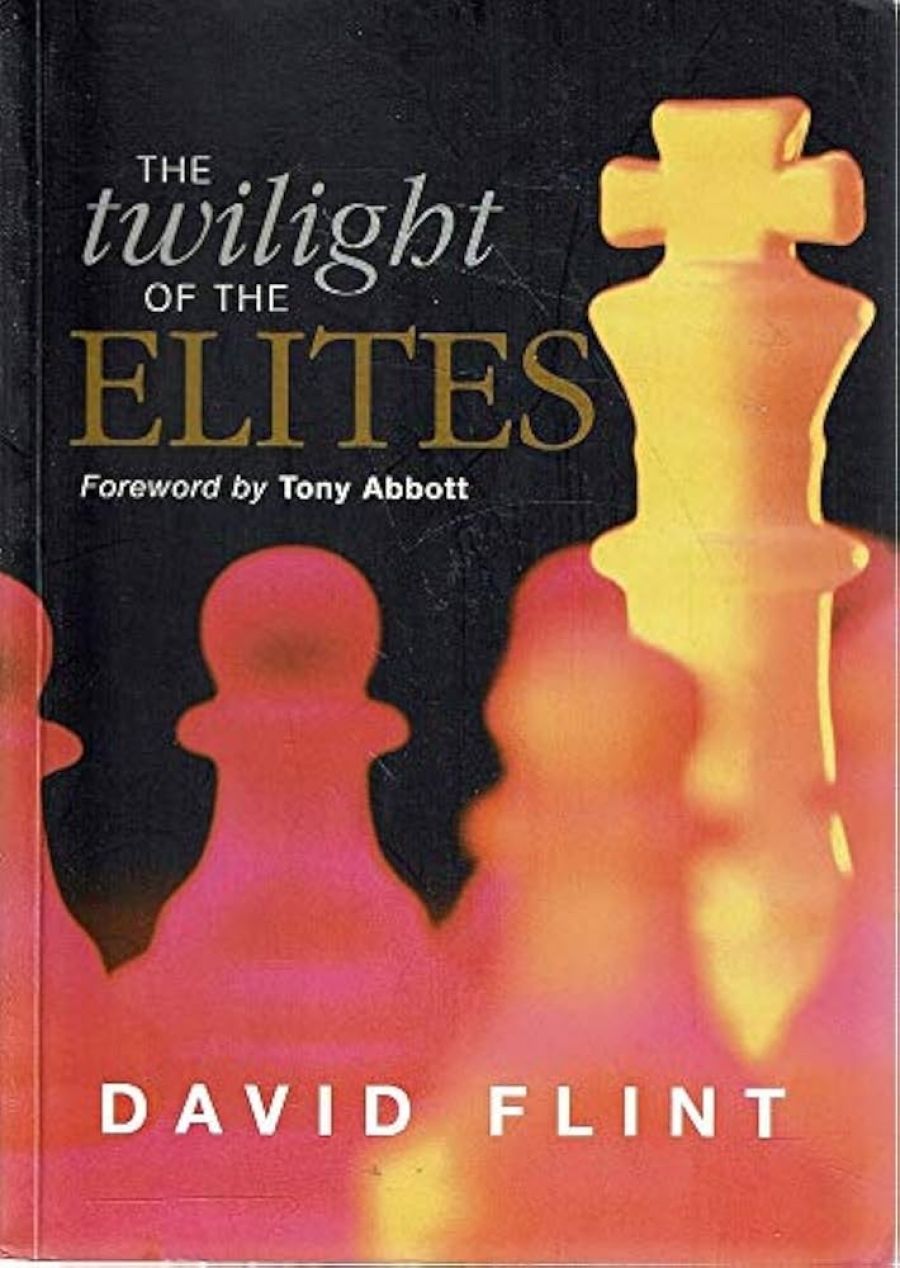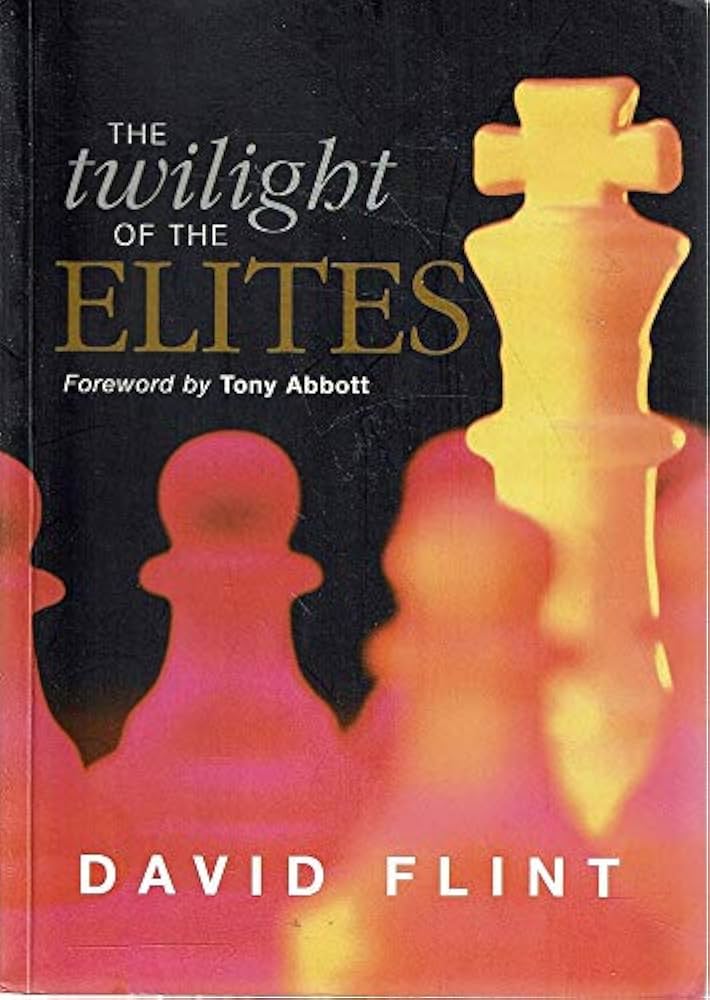
- Free Article: No
- Contents Category: Politics
- Review Article: Yes
- Article Title: Élititis
- Online Only: No
- Custom Highlight Text:
During his lengthy career as editor of the Daily Express, Arthur Christiansen visited Rhyl, one of those grim towns that passes for a seaside resort in the English north. Strolling along the promenade with his wife, he was fascinated by the people: ‘Their flat, sallow northern faces, their Sunday-best clothes, their curious capacity for enjoying themselves without displaying any signs of emotion, moved me – people in the mass always do.’ Returning to London, he wrote a bulletin describing ‘the composite Englishman’ whose interests and perspectives his reporters should always have in mind. Christiansen called him ‘THE MAN ON THE RHYL PROMENADE.’
- Book 1 Title: The Twilight of the Élites
- Book 1 Biblio: Freedom Publishing, $29.95 pb, 250 pp
- Book 1 Cover Small (400 x 600):

- Book 1 Cover (800 x 1200):

The phrase accompanied him for the rest of his career: on his retirement, staff gifted him with a large framed photograph of Rhyl Promenade in the rain. But for those in the media, Christiansen’s larger point is a resonant one. For whom are we reporting? To whom are we relating? Whose views do we reflect? Whose do we resist? David Flint thinks he knows, and points the finger straight back at us. For we – that is, journalists – are at the head of the ‘élites’. Thus his exposition:
The term ‘élite’ is … a useful, although mildly pejorative, reference to a way of thinking now common in the media, in some university faculties and in the arts. It is to be contrasted with traditional thought, whose advocates are clearly in a minority in those circles, but who represent and enunciate the common sense, pragmatic views of the vast majority of Australians.
It’s a funny old world where Flint, Australian Broadcasting Authority chairman and emeritus professor of law with a trail of degrees from three universities, is more truly demotic than, well, me, son of a divorced school librarian, unencumbered by tertiary education, twenty years a journalist. But if you think you’ve heard this argument before, that’s because you have. It’s the recurrent conservative gripe that today finds outlet in questions like ‘Why oh why do they pick on a great Australian like Alan Jones?’ and ‘Where oh where is the right-wing Phillip Adams?’ It brandishes as evidence such props as the survey by Professor John Henningham (published in the late, lamented Independent Monthly in February 1996) about the cultural and political predispositions of Australian journalists; that is, mirabile dictu, that they tended to lean left on most social and moral issues. Sure enough, this eight-year-old survey, with its relatively small and inevitably skewed sample, reappears in The Twilight of the Élites, where Flint describes it as ‘Professor Henningham’s revelation ... that your average journalist is not your average Australian’. It’s piquant that Flint should quote an academic in support of his position, considering what he says about universities elsewhere – but, well, they have their uses when they agree with us, don’t they?
Just because we’ve heard it before, of course, is no reason not to hear it again. Accepted on its own terms, The Twilight of the Élites is just fine: a readable digest of various strands in current conservative thought, with some parts of which I disagree violently, to other parts of which I am far from antagonistic. It presents a simplistic opposition between ‘élite’ and ‘traditional’ thought without explaining how social conservatism found itself a bedfellow with economic extremism, but that is probably because it is less an effort at persuasion than solace for the already converted. It’s not an unduly self-important book, and is leavened with a droll sense of humour.
Nowhere, of course, are the élites really mapped, delineated or even defined in anything but the most general terms. But that’s the whole point, I suppose; it preserves the freedom to dismiss any dissenting voice as out of touch with ‘the common sense, pragmatic views of the vast majority of Australians’. Flint wheels out the usual job lot of élite media voices in order to advance his case: Phillip Adams (small national audience), Mike Carlton (small Sydney audience) and Stuart Littlemore (no audience). Then, with a straight face and the utmost confidence, he asserts: ‘There is undoubtedly a greater degree of homogeneity in the social, cultural and political values and opinions of Australia’s journalists than in comparable countries.’ QED.
The print and broadcast media, to be sure, have many problems – oh, so many problems. A hegemony of the trivial prevails. We’d only be interested in Rhyl Promenade today if it served a decent latte. But institutionalised prejudice? ‘Media bias’ is one of those weasel phrases that usually translates as ‘showing the wrong bias’. Had the ABC begun daily broadcasts during Gulf War II with ‘The Battle Hymn of the Republic’ and run nothing but tributes to American nobility and Australian bravery, for example, it’s unlikely that the government would have chided it for warmongering. The allegation of bias, moreover, comes always with the belief that an opinion and value-free journalism is not merely possible, but being consciously and mendaciously avoided. Is this true? Up to a point, Lord Alston.
There are problems with arguments such as Flint’s that dwell on ‘average journalists’ and ‘average Australians’. Anything purporting to reduce a sample to averages is inherently distorting: as they say in marketing, the average customer has one tit and one ball. They involve, too, a couple of related assumptions: firstly, that, just because a journalist holds a certain world view, they will report everything they see, hear and find accordingly; secondly, that a media’s duty is to fall in line with some ‘average view’.
To the first assumption, there are many exceptions. For a reporter, a host of other considerations are weighed before a story’s coherence with a political view. Is it topical? Is it sexy? Is it likely to catch my editor’s eye? If it is tilted for anything, the journalistic playing field leans toward sensation. Holding a view, moreover, scarcely enslaves one to it. Reporters are as free to lean against their politics as with them – and they do. In George Orwell’s famous words: ‘The more one is aware of political bias, the more one can be independent of it, and the more one claims to be impartial, the more one is biased.’
The second assumption is exceptionally dangerous. It seems to me that a press chiefly concerned with reflecting the infatuations of the age is failing in its duty. It was the advice of the first great editor of The Times, Thomas Barnes, that men in his position err on the side of outspokenness:
John Bull, whose understanding is rather sluggish, requires a strong stimulus … He dozes composedly over his prejudices which his conceit calls opinions; and you must fire ten-pounders at his densely compacted intellect before you can make it comprehend your meaning or care one farthing for your efforts.
We already have people expert in reflecting back to the public its own assumptions and prejudices, pretending to listen, pretending to care: they are called politicians. Even for the populist Christiansen, identifying the Rhyl Promenaders didn’t entail identifying with them:
I saw them all as a challenge. It was my job to interest them in everything that was happening, to show them the world outside Bolton and Bacup, to fire them with the ambition to travel, to give them the courage and confidence to overcome the drabness of their lives, and to show them how to overcome it.
The most delicious aspect of the conservative myth of silence, however, is that it echoes almost exactly a flourishing left-wing idée fixe. John Pilger’s The New Rulers of the World (2002), typically, contains a lengthy moan in terms quite similar to Flint’s: never before, Pilger complains, has the media stuck to such ‘politically safe’ information. When I remarked to Pilger on radio last year that it was hard to complain about being silenced when one wrote for the Guardian and New Statesman, had just screened a television documentary and published a book, I had to sit out a lengthy blizzard of scorn. George Monbiot, recently in Australia to promote The Age of Consent (2003), contends likewise that the world is under the thumb of ‘a few self-appointed and unaccountable men in the rich world’ who quash rival opinions – a gutsy call in a book bearing a publishing imprint owned by Rupert Murdoch.
There is a difference, of course, and it lies in the interpretation of electoral quiescence. For the right, this can only imply the triumph of ‘common sense, pragmatic views’; for the left, it indicates the prevalence of pernicious propaganda. There is a third alternative, and it should trouble them both: that the majority – disaffected, apathetic, protective mainly of their own interests and comforts – simply does not care. This is something of which the media has been queasily fearful for some time: that those strolling Rhyl Promenade today probably don’t give a damn what we write, say or think.


Comments powered by CComment